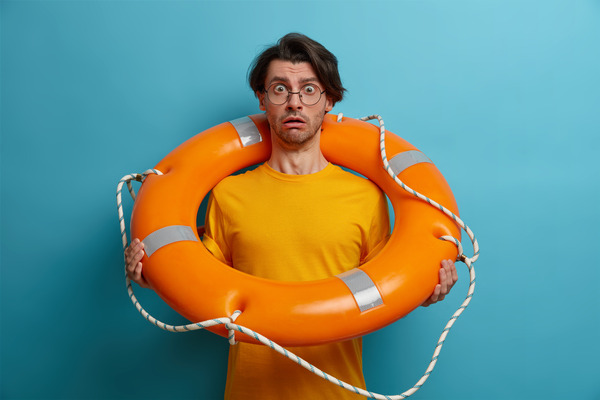Do you know what thalassophobia is? Don’t you know what it’s called to be afraid of the sea? Discover the reason for this phobia of water and how to deal with it through psychology.

The thalassophobia It is an irrational fear of the sea and the depths of the ocean. This fear of the sea is classified as specific and affects some people, causing anxiety, a feeling of danger and discomfort.
In certain cases, the thalassophobia or phobia of the sea The oceans are associated with traumatic events that end up leaving their mark and manifest in this fear, but, as with all phobias, we may not be able to find a specific cause for it. Before delving into the causes, symptoms and treatment to overcome it, let’s see where the apparently strange word that gives it its name comes from.
Fear of the sea: What is it called?
Many people do not know that the sea phobia name It’s Thalassophobia. Thalassophobia, or thalassophobiacomes from Greek and is composed of the union of two concepts “thalassa” what does sea mean and “phobos”, which alludes to fears and phobias. Thus, it is not a new concept, since it has affected civilizations for several centuries.
Let’s give two examples of fear of the sea: in the Middle Ages the phobia of the sea and open oceans was a natural fear, as much as the fear of hunger or epidemics, and in the Chinese Ming dynasty the sea was completely turned away from it. ignorance of the dangers it hid. More than 100 years ago, at the beginning of the 20th century, the French doctor and professor Emmanuel Régis included thalassophobia in its Treaty of Psychiatry in which he described all the types of existing fears, including the fear of elements such as air, fire, earth or the sea.
What is thalassophobia?
Thus, specifying what is thalassophobia Thalassophobia is an unfounded fear of the depths of the ocean. The fear of the sea is not of drowning, but of not knowing what is in it, of not seeing what is underneath, of not knowing the immensity of this environment and of not knowing what we will find swimming or if we submerge our feet or hands. These are the most common fears among thalassophobes:
- Fear of appearing sea animal like a shark, a whale or an octopus or being attacked by a crocodile, a piranha, etc. Therefore, people who suffer from thalassophobia feel a fear of the deep sea.
- Terror at the thought that someone unknown entity It drags us by our feet to the depths of the sea or the ocean.
- Fear of forming a whirlpool or a large sea hole that sucks us from below without being able to do anything to avoid it.
- Fear that beneath us there will be stranded objects, sunken ships or large ancient structures that can rub our feet.
- Fear of deep sea, since it is unknown what is at the bottom of the sea or ocean. The phobia of the bottom of the sea is one of the most common within thalassophobia.
- Fear of deep water even if it is not in an ocean or in the amr.
Symptoms of thalassophobia
Mostly, fear of the sea shares many of the symptoms felt when having another phobia. This fear of the ocean or sea water is usually accompanied by the following signs.
- Physical symptoms: The physical symptoms of thalassophobia They appear when people who suffer from it are exposed to large masses of water and result in mild dizziness, tachycardia, a feeling of lack of air, sweating, muscle tension, tremors, dry mouth and difficulty thinking clearly.
- Lost of control: Generally, people who suffer from this fear of the bottom of the sea They are fully aware of the irrationality of their fears, but they feel a great loss of control, alertness, and a clear sense of danger.
- Avoidance of water-related activities: Furthermore, this state of anxiety or discomfort that goes hand in hand with thalastophobia or phobia of the sea It means giving up doing certain activities. People who suffer from sea phobia not only do not submerge any part of their body in open water, but they may also feel alarmed if they see the sea from afar, get on a boat or see situations in a photograph that take them to a sea. potential marine hazard.
- Feelings of anxiety: One of the most obvious symptoms of the phobia of the sea They are precisely the feelings of anxiety. People who are afraid of the ocean or the sea usually suffer panic attacks when they are in a situation where they have to face this situation.
- Desire to escape: In many cases, people who suffer from this phobia of the depths of the sea or sea water They usually experience a great aversion when they are close to it. Something that translates into a desire to escape and avoid any situation that is related to this environment.
The Spanish Society of Psychiatry and the Royal College of Psychiatrists from the United Kingdom in a report on anxiety, panic and phobias confirms that, in response to these fears, people who suffer from fear of the sea tend to avoid situations that cause them anxiety. But, according to this report, this only makes the fear worse. Therefore, it is important to go to a mental health specialist if you suffer from it.
Thalassophobia test
Although there is no proof or thalassophobia test To diagnose the extreme fear of deep water or the sea, there are a series of signs that can help us identify this problem:
- Your fear of deep water is persistent, excessive and unreasonable
- You feel this fear every time you are exposed to deep or open water.
- You realize that your fear is disproportionate to the real dangers.
- You avoid the ocean or other waters or endure them with intense fear
- Your fear of large bodies of water interferes with your normal functioning
- This fear has been present for six months or more
- This fear is not related to another disorder such as generalized anxiety disorder or post-traumatic stress disorder.
If you identify with many of these situations, it is likely that you are in a thalassophobia case

Main causes of sea phobia
There could be multiple reasons for this. fear of the ocean and other irrational fears. If there is no clear trigger, it is possible that it is the sum of several elements that has led to the development of sea phobia: from genetic factors to negative experiences in the ocean in the past. In fact, the most common cause is the consequence of a traumatic event.
In this way, there are people who, after surviving shipwrecks, boat accidents, shark attacks or even tidal waves, develop thalassophobia The accident causes trauma in the person who suffers it and, as a result, they may suffer from post-traumatic stress, therefore, thalassophobia is a direct consequence of this dramatic event. Therefore, the main causes of water phobia or fear of the sea are mainly the following.
- Genetics: One of the causes of phobias It is precisely genetics. This is because our ancestors were more cautious around the sea because they were more likely to survive and transmit genes to their descendants.
- Past experiences: In some cases the thalassophobia or phobia of the bottom of the sea or fear of the sea It is due to certain experiences or traumas that have been experienced. These bad times around water can lead people to develop thalassophobia.
- Education: Another of the causes of the most common phobias is precisely the education that is perceived from parents or the most influential adults of childhood. When children see others having fear of the sea They can develop the same phobias during adulthood.

Other phobias of water
Thalassophobia is not the only afraid of water There are many other phobias that affect people when they come into contact with this element. We highlight some of them.
- Aquaphobia or hydrophobia: Is he irrational fear to water in general and any contact with it. People who suffer from it may develop avoidance of any contact with this liquid, even in a bathtub at home.
- Bathophobia: In this case, what generates terror is the sensation of depth and abyss and it can occur both in the ocean and in a lake, in the pool or in places where there is no presence of water, such as a long tunnel. The differences between thalassophobia and bathophobia are that the first is only in the sea or ocean while the second can also occur in other environments.
- Potamophobia: It is a little-known specific phobia, but it consists of an irrational fear of rivers, springs, waterfalls and other water currents.
- Cymophobia: Closely related to the thalassophobia and bathophobia, cymophobia is the fear of waves and the undulating movements of the sea.
- Ablutophobia: The act that causes fear in this case is the water of daily cleaning. It is a rational fear that, like others, can have its origin in personal trauma.
In many cases where a sea phobia, the ocean or any phobia of water, in order to face it, we must work on the origin of the fear of the sea. In this way, assistance from a professional psychologist can be helpful.

How to deal with a phobia of the sea?
There are a series of tips that we can follow to try overcome thalassophobia According to psychologists, we can overcome the phobia of water through the following tips.
- Use relaxation strategies: At the moment of beginning to feel the symptoms of water phobia It is vital to try to relax both the mind and the body. Therefore, relaxation techniques can be very effective in dealing with thalassophobia.
- Display: You can use your mind and imagination to your advantage to try overcome the fear of the sea or the phobia of water In the moments when the first symptoms of fear appear, you should try to visualize yourself overcoming the same phobia.
- Self-exposure: To try to overcome so much fear of the sea, ocean or water, it will be essential to try to expose yourself to fear. Start small and try to use certain techniques to deal with thalassophobia.
- Talk to your circle: May others understand your fear of the sea It is essential to rationalize these irrational fears. In this way, by sharing thalassophobia with others you will be able to understand why this fear arises in you.
- Self-knowledge: Sometimes working with ourselves allows us to know the reason for certain attitudes we have in our lives. For this reason, we can overcome water phobia knowing ourselves.
How to overcome the phobia of the depths of the sea?
He treatment to overcome thalassophobia It is similar to what we would receive to treat other more common phobias such as arachnophobia or claustrophobia. It is recommended that when this fear of the sea is detected, the patient should go to a psychologist.








